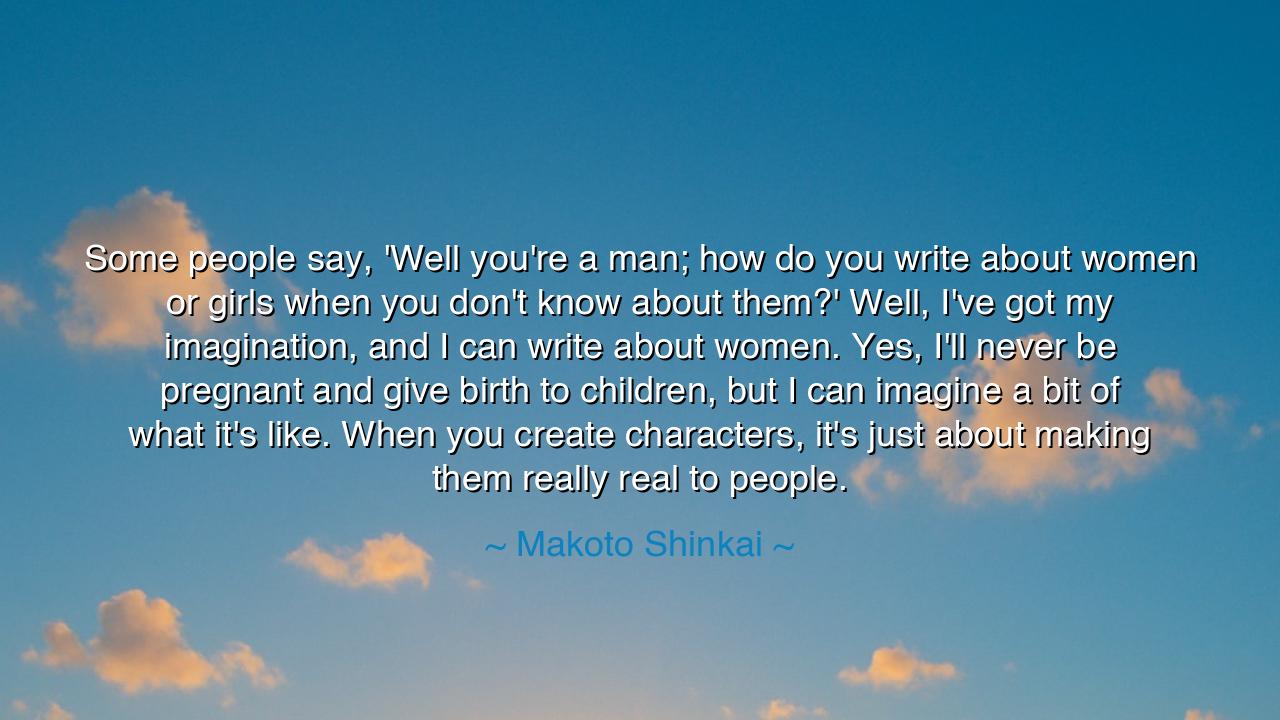
Some people say, 'Well you're a man; how do you write about women
Some people say, 'Well you're a man; how do you write about women or girls when you don't know about them?' Well, I've got my imagination, and I can write about women. Yes, I'll never be pregnant and give birth to children, but I can imagine a bit of what it's like. When you create characters, it's just about making them really real to people.






The words of Makoto Shinkai — “Some people say, ‘Well you’re a man; how do you write about women or girls when you don’t know about them?’ Well, I’ve got my imagination, and I can write about women. Yes, I’ll never be pregnant and give birth to children, but I can imagine a bit of what it’s like. When you create characters, it’s just about making them really real to people.” — carry a wisdom that transcends the craft of storytelling. They speak not merely of writing, but of empathy, of the boundless imagination that allows the human heart to step beyond its own limits and walk for a moment in another’s life. For imagination, when wielded with compassion, becomes a sacred bridge between the known and the unknown — between the self and the other.
The ancients knew that true creation demands both courage and humility. To create characters — to breathe life into souls who never lived — is to act as a small mirror of the divine, shaping worlds from the invisible clay of the mind. Yet such creation is not an act of arrogance, but of reverence. When Shinkai says, “I can imagine a bit of what it’s like,” he reminds us that imagination is not the claiming of experience, but the honoring of it. The wise creator does not pretend to know everything — instead, he kneels before what he does not know and asks to be taught by his own heart.
So too did the great storytellers of the past embody this sacred act of empathy. Consider William Shakespeare, who, though a man of his time, wrote women of astonishing depth — Portia, Juliet, Cleopatra, and Desdemona, whose strength, wit, and sorrow still speak to the soul centuries later. Did Shakespeare live as they lived? No — but he imagined, and in that act of imagination, he reached a truth beyond gender, beyond circumstance, beyond the limits of his own flesh. For in the realm of art, to imagine with honesty is to understand more deeply than knowledge alone can grant.
The imagination Shinkai speaks of is not a mere tool of fantasy — it is the essence of connection. Through it, we glimpse the interior worlds of others, even those utterly unlike ourselves. A man may imagine the grief of a mother, a woman the fear of a soldier, a child the wisdom of age. In this sacred exchange, humanity becomes one tapestry woven of countless perspectives. To imagine another’s struggle, even imperfectly, is to plant the seed of compassion, and from that seed grows the unity that every age has sought.
Think of Harriet Beecher Stowe, who wrote Uncle Tom’s Cabin in a time when the pain of enslavement was not her own — yet her words, born of empathy and imagination, stirred the conscience of nations. Abraham Lincoln himself is said to have greeted her with the words, “So you’re the little woman who wrote the book that started this great war.” She had not lived the suffering she described, but she listened deeply to it in her heart. And thus, imagination became not illusion, but revelation.
Makoto Shinkai, in his animated works, follows the same path — crafting stories like Your Name and Weathering With You, where boys and girls cross boundaries of time, body, and fate. Through his imagination, he teaches us that identity is not a barrier but a bridge; that the human soul, when it dares to understand another, becomes infinite. The act of creation, then, is not about perfect accuracy, but about truth that feels alive — the truth that every heart beats with longing, fear, and love alike.
Let this be the lesson for all who seek to create or to understand: do not let your limitations become cages. You may not have lived every life, but you can imagine, and through imagination you can feel. And to feel is the beginning of wisdom. When you tell stories — whether with words, art, or deeds — strive not to be perfect, but to be sincere. Listen deeply. Observe gently. Let compassion guide your vision until every character you create, every soul you meet, becomes real to people.
For the ancients would say: to imagine another’s heart is the noblest act of the mind. It is how the mortal touches the eternal. So wield your imagination not as a weapon of invention, but as an instrument of understanding. For in the end, the truest art, and the truest life, are both born from the same sacred fire — the courage to see yourself in all others, and all others in yourself.






AAdministratorAdministrator
Welcome, honored guests. Please leave a comment, we will respond soon